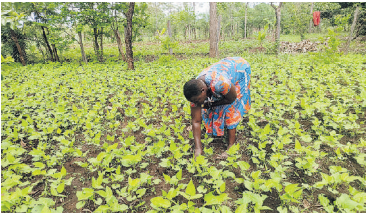
 Patricia Kanyua grows beans using compost manure as fertiliser /AGATHA NGOTHO
Patricia Kanyua grows beans using compost manure as fertiliser /AGATHA NGOTHO
In the drylands of Tharaka Nithi County, a quiet transformation is taking place. Local farmers are moving away from conventional farming and embracing agroecological practices, an approach that is helping them save money, improve their health, and build resilience to climate change.
This shift has been made possible through training and support from the Rural Initiatives Development Program (RIDEP), with backing from PELUM Kenya.
Patricia Kanyua Kimathi, a farmer from Gakirwe village in Tharaka South sub-county, says switching to organic farming has changed her life. Not only has it saved her money, but it has also helped her live a healthier life.
“Before, I relied on fertilizers and pesticides to grow my crops and fight pests and diseases,” she explains. “But since I was trained on agroecology and organic farming by RIDEP through PELUM Kenya, I’ve never looked back.”
Through the training, Kanyua learned better planting methods, kitchen gardening techniques to reduce vegetable expenses, and even how to raise goats and chickens.
“I’ve been trained on saving money for organic farming, goat keeping, and involving children in farming,” says Kanyua, a member of the Utumi Self Help Group.
The training has also taught her how to manage chicken diseases using proper farm hygiene and natural remedies made from locally available materials. Farmers were also instructed on water harvesting and recycling methods to support their farms during dry periods.
“I now make compost manure instead of buying fertilizer and use biocontrol methods to manage pests,” she adds. On her farm, she grows traditional vegetables, beans, onions, garlic, and turmeric—all organically.
“I want to grow food without chemicals to protect my family's health and that of my neighbors and customers,” she says.
Susan Wanjiru, a project manager at RIDEP, says their mission is to help farmers adopt agroecological methods while generating income from their farms.
“We build farmers’ capacity to use available resources—like making compost and biopesticides from what they have,” Wanjiru explains. “This is essential for healthy crops and long-term sustainability.”
RIDEP also runs a demonstration farm where farmers and even students from schools and universities can learn about agroecological practices.
Water conservation is another key focus. “We teach farmers to build water retention structures so water soaks into the ground rather than running off. This helps during the dry seasons,” Wanjiru adds.
The use of indigenous seeds is emphasized, as they are more drought-resistant. “Tharaka Nithi experiences long dry spells, so using seeds adapted to the environment improves production,” she says.
RIDEP supports a seed bank and encourages communities to start their own. They also promote value addition—processing crops to increase market value and income.
“By producing their own compost and biopesticides, farmers reduce their dependence on agro-vets,” Wanjiru notes. “And because they don’t use chemicals, their health improves as well.”
RIDEP also helps farmers form groups and sell produce collectively at aggregation centers, which boosts bargaining power and cuts out exploitative middlemen.
PELUM Kenya has played a key role in training community development facilitators who serve as local extension officers, spreading knowledge through workshops and field visits.
Anastacia Kanina, a Community Development Facilitator Assistant at RIDEP, says they currently work with 20 farmer groups.
“We visit farms and train people on how to use local resources to make compost and cut costs. Farmers also come to our center for training on organic farming,” she says.










